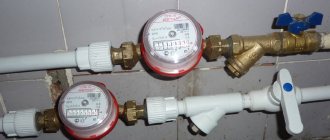assets/from_origin/upload/resize_cache/iblock/03c/600_450_2/03cc46e024a478d677ecc94a69c545de.jpg From this article you will learn:
- At whose expense is the replacement of batteries in the apartment carried out?
- How to correctly submit an application to the management company for replacement of heating radiators
- What to do if you are denied battery replacement
- What bureaucratic difficulties may arise when replacing batteries?
Warmth always adds coziness to a home. But it happens that due to a lack of power of the heating device or its malfunction, it becomes somehow chilly and there is not enough heat. One solution here is to change the batteries. But at whose expense is the battery replaced in the apartment? On the one hand, it seems clear that the residents pay all expenses themselves. But the Housing Code of the Russian Federation makes it clear that the entire building, including the roof, as well as passing engineering systems (including heating) are common property, and accordingly, your housing organization finances all costs. Let's look at the nuances together.
At whose expense is the replacement of batteries in the apartment carried out?
In Art. 36 part 1 of the Housing Code of the Russian Federation states that plumbing and other equipment can be classified as common equipment if it serves more than one room. And the Rules for the maintenance of common property in the MKD PP of the Russian Federation (dated August 13, 2006 No. 491 clause 6) confirm that batteries, as well as the entire intra-house heating system, including heat meters, fittings, pipelines, belong to common property. Therefore, it is the responsibility of the management company to maintain and maintain this property, and according to the law, homeowners do not have to pay for this work.
Meanwhile, paragraph 5 of the Rules says that if the radiator has a shut-off valve, a valve that allows you to shut off the flow of coolant, then the device no longer applies to general house networks. Simply put, if the batteries can be disconnected from the heating system of the house, then they are exclusively the property of the owners.
So the one who installed the valves and shut-off devices that shut off the heat supply is responsible for his radiators in the apartment. That is, the section of the network up to the shut-off valve is the property of the management company, everything that follows is yours.
Elimination of damage to common property is financed from the common fund of residents of an apartment building, collected by all owners. This is the money that is paid according to receipts (article “Maintenance and repair of common property”).
At whose expense are batteries replaced in an apartment in Moscow, which is social housing? As we said above, all costs for replacing the heating system are borne by the owner of the property, that is, the mayor’s office.
Recommended articles on this topic:
- Arrangement of a small apartment
- Quick apartment renovation
- Turnkey cosmetic repairs
But the presence of an input valve in the room sends us to an already known scheme: the bill for reinstalling the battery is paid by the employer. And the lease agreement, under which a municipal apartment is transferred, obliges the tenant to take care of the equipment and independently carry out the necessary routine repairs in the premises. So, by law, replacement and repair of heating system equipment in an apartment is carried out at the expense of the tenant, since this work can easily be classified as routine repairs.
The owner will have to pay himself even if he wants to replace the old radiator with a new one.
But at whose expense is the battery in the apartment replaced if it is in disrepair? On this issue, the Ministry of Regional Development of the Russian Federation has a clear position that, regardless of whether it is a municipal or private form of ownership, heating elements are classified as common property, with the exception of the case indicated above.
From which it follows that in an emergency situation - a pipe burst due to a high level of wear, a rupture occurred as a result of a pressure drop or for another reason - the organization to which residents pay a monthly fee for major repairs will replace it, without charging additional payment. So the answer to the question at whose expense the battery in the apartment is replaced if it is in disrepair is clear: at the expense of the housing organization that carries out maintenance of common property - the management company, homeowners' association or housing cooperative.
There is no doubt that housing companies are not used to publicizing such data. Of course, it is more profitable for them if apartment owners not only purchase radiators themselves, but also pay bills for the dismantling and installation of equipment.
In addition, the service organization will find a bunch of reasons not to do the work: there is no employee or equipment, they will offer to repair the old battery, or even stand in line. This wait can last for months. A good owner will not freeze his family and will install a radiator in the apartment at his own expense in the hope that in the future the management company will compensate for all expenses. But no, departments are in no hurry to pay their bills, and judicial practice confirms that they should not do this.
Disabling risers
In response to my request, the Management Company said, . Show in full Hello!
Please tell me this is the situation. They turned off the control valve on the fifth floor (no need to throw slippers, it happened by accident - they turned off the battery, they forgot to open the control valve).
since it happened in winter, overnight. Show in full Good afternoon. When we contacted the management company Zhilischnik in the Rostokino district (Moscow) regarding the disconnection of the hot water and hot water risers, as well as the overcooking of the heated towel rail, we received a refusal to pay for work on the heated towel rail (“at the moment we do not provide these services.
Show in full Good afternoon!
I live in a multi-storey building, I want to replace the heated towel rail, which is made of a plastic pipe, with a metal one and, accordingly, install pipes for hot and cold water as it is convenient for me, I contacted the management company with which.
Who needs to be paid {q} Is there an official price list {q} They require payment of 1000 rubles for disconnecting the riser.
Is this legal {q} Who needs to pay {q}
Is there an official price list {q} They require payment of 1000 rubles for disconnecting the riser. Is this legal {q} Keep this in mind, otherwise there MAY be trouble.
But replacing the radiator cost about 1000 rubles, although in life they ask for three. Or they should do it for free (if there are no shut-off valves according to the house design). You just need to know your rights and laws and not mumble in the UO-ZhKS.
I was given new radiators FREE OF CHARGE.
In general, of course, the price is too high, their standard hour is 30 dollars {q}
The job consists of turning on the faucet in the attic, then in the basement, and draining hot water from the riser through the vent valve. Work 15 minutes. By the way, it’s interesting whether the prices are set by the general director of housing and communal services, and the same in other housing complexes, or the prices are uniform throughout the city and set by Housing Committee {q}
Part 2 of Article 162 of the Housing Code of the Russian Federation establishes: Clauses 1 and 2 of Part 3 of Article 162 of the Housing Code of the Russian Federation establish: “3.
Based on the presented standards, the service of turning off the water supply risers may be included in the maintenance if this is provided for in the HOA estimate, which seems unlikely for the same reasons as in the case of management of the house by the UO.
Taking into account the above, it seems necessary for the OU/HOA to fulfill: 1.
they also like to spread caviar on bread Starnet122, 3 points of 2 pipes - supply and return.
Total 2x3x300= 1800. Not everyone lives in Moscow. Not yours, but common with your neighbors. The water in the house and in the risers is common, so if you drain it or at your request, then you pay for it, but there is not much water in the risers and if it is in the estimate, it will not be very expensive.
3 points of 2 pipes - supply and return. Total 2x3x300= 1800. Not everyone lives in Moscow.
So in Moscow it’s also 500-600 rubles for a riser (I don’t know how it works with two tubes, maybe they charge for one riser). If it is not the management company, but someone from the outside who does it, disconnecting the risers can be 2-5 times more expensive and you will have to pay for each hour of disconnection. If the extortion is illegal, then everything is simple: file a complaint with the housing inspector and I will recalculate everything as it should be.
https://www.youtube.com/watch{q}v=9r9pKHHPU7s
If the extortion is legal, then the housing inspector will simply explain why it costs money and how much it costs.
How to correctly submit an application to the Criminal Code to replace batteries
To replace the radiator, the owner or tenant must submit an application to their housing company:
- about replacing a heating device in an apartment;
- about closing the common riser and draining water from it.
There is no clear form for such a statement, enshrined in law. Typically, the service organization itself creates a template in a form convenient for it.
The application is addressed to the head of the management company, it indicates:
- name of the management company;
- a text asking you to replace the battery, indicate the reason, and in case of an accident, describe all the details in which the device failed;
- the application indicates your full name, address, your signature and date;
- the following documents are attached to it:
- documents confirming the right to an apartment;
- a copy of the applicant’s passport (the original document is presented when submitting the application);
- technical passport for the apartment with a detailed indication of the location of all elements of the heating system.
You need to register an application with the secretary, write down your number and wait for a response within a month.
Steel
Batteries made of steel can be of two types:
- sectional;
- panel.
Advantages of such radiators:
- long service life;
- ability to withstand high operating pressure - 16 atmospheres.
Flaws:
- low resistance to hydraulic shocks or mechanical stress.
What to do if you are refused to replace the batteries
Of course, you can replace the battery in the apartment yourself in the hope that the management company will reimburse your expenses. But before you do this, think a hundred times.
Unfortunately, practice shows that achieving this payment is very difficult, one might even say almost impossible. As we said above, the court, as a rule, sides with the service organization, which can easily find weighty arguments in its favor. Therefore, before starting a lawsuit with a management company, first consult with a practicing lawyer and find out in what cases you can present an invoice to the management company.
And in order to relieve yourself of responsibility in the event of an emergency, do everything according to the law:
- After drawing up the application in two copies, you must register them with the secretary.
- If they refuse to mark your application as accepted, send it by mail with acknowledgment or registered mail.
- Keep the second copy of the application with you; when the mail notification returns, attach it to the application.
But even then, a housing company can find a lot of reasons not to spend money on replacing a heating device. And believe me, the main argument will be that the owner is responsible for the condition of this equipment.
If the housing company delays replacing the radiator or refuses to reimburse your costs, you will have to resort to last resort. The court will decide at whose expense the battery in the apartment should be replaced. Based on an official statement and a requirement to change the heating device (and you have it and it is registered in the Criminal Code or confirmed by a notification of delivery of the Criminal Code), feel free to file a claim in court.
Bimetallic
The most modern heating devices are bimetallic radiators. On the outside they are made of aluminum, the core is made of high-strength steel.
Advantages of bimetallic systems:
- increased wear resistance;
- chemical stability, allowing the radiator to be connected to copper pipes;
- high level of heat transfer;
- presentable appearance.
Flaws:
- high cost;
- intolerance to frequent draining of water.
How to file an application to the court if the management company refuses to replace radiators
If it was not possible to reach an agreement with the housing company at whose expense to replace the battery in the MKD apartment, write a statement to the court.
The law here is strict. The statement of claim is drawn up in the prescribed form, indicated in Article 131 of the Civil Procedure Code of the Russian Federation. A properly drafted claim will increase your chances of success.
The application is addressed to the magistrate of your district. You can find out all the information on the department’s website, you can contact the office in person or call.
The header of the application states:
- name of the judicial authority;
- information about the judge, if available;
- information about the applicant: his full name, registration address, residence, as well as contact telephone number;
- information about the defendant, in our case this is the management company (its name, full name of the director, legal address and location of the organization).
And then describe your problem. In this part, you can not skimp on color and more fully reveal the essence of the issue with which you addressed the judicial authority:
- what do you see as a violation of your rights;
- describe the essence of the claims;
- how the owner tried to resolve the conflict and what he achieved;
- responses and actions of management company employees;
- where the owner turned for help;
- list of requirements.
And then you need to set out the requirements that you place on the service organization: pay a bill to a third-party organization or replace the battery in the apartment. The application also records which and on how many sheets of the application you are attaching:
- photographs and video footage confirming the violation of your rights;
- examination results, invoice for expert services;
- receipts, bills for the apartment;
- other documents that, in your opinion, serve as evidence in this case.
Next is the signature and date of the document.
And together with a receipt for payment of the state duty, the entire package is sent to the court to resolve the issue at whose expense to replace the battery in the apartment.
If the amount of the claim does not exceed 50,000 rubles, then send the documents to the magistrate’s court. If its cost is higher, then go to arbitration. Similar rules are established by Article 35 of the Arbitration Procedure Code of the Russian Federation. The legislation allows 30 days from the moment of registration of your application for the consideration of the case by the magistrate court and 2 months by the district court.
If the conflicting parties managed to reach an agreement before the start of the case in court, then the applicant has the right to waive the claims.
Heating system MKD
At first glance, the heating system of an apartment building is not much different from the method of heating other types of housing. However, it has its own nuances. It starts with inlet valves that cut off the house from the heating main. Along the flange closest to the external wall, there is a division of the areas of responsibility of the management company and the service provider. This important point helps in due course to determine who should replace the heating in an apartment building.
In addition to batteries, bottlings and risers, the system includes:
- hot water taps on the supply and return pipelines (one or two);
- a heating elevator that supplies hotter water through a nozzle into the socket, and through a suction, takes part of the water from the return pipeline into a repeated cycle into the heating circuit. The diameter of the nozzle regulates the temperature of the mixture and radiators;
- house valves that cut off the heating circuit. In summer they are closed, in winter they are open;
- vents - valves for bypassing or draining the system and other elements.
Who can replace batteries?
When replacing radiators with your own funds, you have to choose a direct contractor. Who has the right to carry out this work?
You have the following options to choose from:
- Replace the battery in the apartment yourself if you have professional skills.
- Hire a private owner.
- Contact third-party specialized organizations.
- Call a technician from a service organization.
Note that the second and third options are not very practical. If any unforeseen circumstances arise when replacing the battery in the apartment, at whose expense will the breakdowns be repaired? That's right, for yours. And you yourself will deal with third-party companies or private owners.
If you decide that you will replace the battery in your MKD apartment at your own expense, write an application to the organization that services your home.
Let's explain why:
- its specialists have all the connection diagrams and are familiar with the features of centralized heating;
- have access to disconnection points and heating supply points to apartments;
- They will also be responsible in the event of force majeure.
Aluminum
Devices of this type may vary in functionality and form.
Advantages of aluminum batteries:
- variety of product options;
- light weight, allowing installation of radiators alone;
- quick response to changes in coolant temperature.
USEFUL INFORMATION: Is it possible to paint hot radiators during the heating season?
Flaws:
- the need for air removal;
- inadmissibility of contact with other metals due to the threat of destruction due to a chemical reaction.
Who will be responsible in the event of an accident?
Both parties can be at fault in the situation – both the apartment owner and the housing company.
At whose expense is the battery replaced in the apartment? If the radiators are in poor condition, then, as a rule, the fault lies with the service company, which is also obliged to replace the emergency devices with new ones free of charge.
But this is only if the owner:
- did not replace radiators in his apartment without approval;
- did not involve third-party craftsmen;
- did not violate the integrity of the heating system in the apartment and the rules of its operation.
As you can see, it seems that the owner has a choice, but any step taken without the consent of the management company automatically makes him the culprit of the incident and leads to financial expenses.
So all that remains is to choose one of all possible options - when replacing the battery in an apartment, trust your management system.
How long is the service life according to GOST?
The scope of production and operation of batteries is regulated by GOST 31311-2005 and SP 60.13330.2012. They indicate the service life of heating devices, depending on the materials from which they are made:
- cast iron lasts 25-35 years;
- bimetallic – 25-30 years;
- aluminum – 20-25 years;
- steel - 15-20 years.
By finding out which radiators heat your apartment and when they were installed, you can understand whether it is time to replace them.
If the batteries cope with heating the room, maintaining the temperature in the apartment from +18 ° C, do not leak and do not have other defects, the management company may refuse to replace them even if their service life has expired.
Representatives of the management company can assess the condition of the heating batteries. As a result of the inspection, the commission will draw up an act in which the necessary recommendations will be given. If it is recommended to replace radiators that are common property, you can write an application for these manipulations to be carried out by the management company itself.
How much will it cost to replace radiators?
There is a category of beneficiaries for whom good discounts are offered. If you are not one of them, then the cost of the work will cost from 2 to 5 thousand rubles, not taking into account the cost of purchasing the batteries themselves. In this case, garbage removal after dismantling and installation is usually included in the bill.
The legislation provides discounts for beneficiaries:
- large families with three or more children;
- disabled people;
- families raising disabled children;
- pensioners,
- veterans of labor, WWII, home front workers.
As a rule, third-party organizations very rarely provide discounts, even if the customer presents a full package of documents. Whereas if the battery replacement is carried out by employees of your management company, then you will receive a discount without delay.
Cast iron
Good old cast iron radiators continue to be popular. If such batteries were installed in the house and it was decided to replace them with new devices made of the same material, then you will not have to spend money and time on conducting an examination before installation.
USEFUL INFORMATION: How to select and apply paint to radiators
Advantages of cast iron batteries:
- durability and reliability;
- resistance to corrosion;
- resistance to hydraulic shocks.
Flaws:
- heavy weight;
- limited design.
FAQ
Let's consider the questions that owners of privatized apartments often ask.
Replacing a sewer riser
Since the risers located outside the apartments and connecting several of them are common property, the management company (HOA, housing office, housing department, etc.) is responsible for the replacement. At the expense of the funds that come as part of the rent for the “maintenance and repair of the common property of the house.”
Any attempts to force people to pay additionally for this work will be illegal.
When trying to reject a requirement to replace the riser, to defend your position, you should refer to regulatory documents:
- rules for maintaining the common property of an apartment building;
- Methodological recommendations MDK 2-04.2004.
As proof of fulfillment of your responsibilities for timely payment of utilities, copies of the payment receipt can be attached to the application for repair work.











